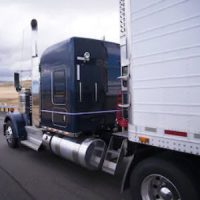What To Know About Stopping Distances And Related Trucking Accidents

The magnitude and mass of large tractor trailers greatly makes any impacts and damages resulting from accidents much worse. Tractor trailers and other large commercial trucks, especially ones carrying full loads, need much longer distances to stop than your average passenger vehicle.
The bureau in charge of regulations for interstate trucking, the Federal Motor Carrier Safety Administration (FMCSA), considers the long stopping distances of commercial trucks to be one of the biggest safety challenges. When truckers misjudge the stopping distance required to reach a complete stop, crash victims tend to suffer horrific injuries or even death.
Avoiding Accidents with Tractor Trailers
Drivers of other vehicles should always be as cautious and vigilant as possible when driving in the vicinity of tractor trailers. It is important to maintain a reasonable distance from large trucks, especially ones that are speeding. Whenever possible, drivers should give truck drivers as much warning time as conceivable of their plans to merge lanes, turn or stop. Additional warning time provides truckers with more time to safely slow down or stop. Defensive drivers should always have a plan to evade any unnecessary dangers on the highway.
Some crucial advice for avoiding a crash with a tractor trailer is as follows:
- Never cut off a tractor trailer or large commercial truck;
- Always use your turn signals before passing a tractor trailer and ensure that your vehicle has enough distance between the trucker to notify him or her that you are planning on changing lanes;
- Pay close attention to nearby exits on the highway, because truckers are known for making unforeseen lane changes to exit on time;
- Always keep a safe distance between the tractor trailer in front of you; and
- Never drive in a trucker’s blind spot, if you have trouble seeing the trucker in his or her mirrors, most likely they will be unable to see you.
Compensation for Tractor Trailer Accidents
Truckers commonly smash into other vehicles because they fail to allot enough time and distance to reach a full stop. The trucker may be inexperienced, speeding or distracted. In cases where necessary safety precautions are disregarded or the trucker acts negligently, the trucker and/or his or her employer may be held liable for resulting damages. Victims are entitled to compensation through a personal injury lawsuit. Victims can pursue compensation for any of the following that are applicable:
- Lost wages;
- Diminished future earning potential;
- Damage to the vehicle and other property;
- Pain and suffering;
- Medical expenses (present and future);
- Total disfigurement; and
- Post-traumatic stress disorder.
Additionally, if a close family member died as a result of a truck crash, you may have the right to file a wrongful death claim.
Let Us Help You Today
We understand that being seriously injured in a trucking accident can be a life-shattering experience. Our personal injury attorneys have handled numerous cases for people injured in accidents caused by truckers failing to stop on time. Our dedicated and meticulous lawyers will do everything they possibly can to get you the highest possible compensation.
Our personal injury lawyers have over 100 years of combined legal experience and have recovered millions of dollars in settlements and verdicts on behalf of our clients.
If you or a loved one were injured in a truck accident in Clearwater, Tampa, or Hudson, call Roman & Roman today at 877-767-1032 or contact us online for a free consultation.
